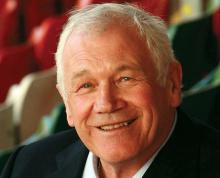Major UK quarrying sector firms are committed to comprehensive worker engagement in their businesses, senior executives told a recent
Martin Riley, the Vice President of Tarmac; Tim Hall, CEO of Breedon Aggregates; Cath Pickett, HSE Inspector Midlands & Wales; Ashley Haslett, EPC Head of Operations and SHEAQ; and Professor Richard Hall, University of Derby Director of Research, Innovation & Impact were the expert panellists at the the IoQ Derbyshire branch ‘Question Time’ styled event in memory of longstanding Derbyshire branch member James Cuthbert at The Centre for Mineral Products Professional Development at the University of Derby’s Enterprise Centre.
Around 50 IoQ Derbyshire branch members, including many vastly experienced and younger local quarry workers, were in the audience listening to the panellists’ views and airing their own thoughts on worker engagement in the quarrying and building materials supply industry.
On putting company employees before overall business outcomes, Martin Riley said: “There’s no business without customers, and no business without people to run it. It’s more about how you manage people. If you go back to when I came into this industry through the Doncaster College route in the late 1980s, the major businesses back then recognised that investing in people was probably more important than investing in yellow iron. I think sometime between then and the mid-2000s we lost our way a bit, and investing in yellow iron became more important in our business. I’m just delighted that, given where we’re sat today, the business has woken up and realised that it’s not sustainable unless we have sustainable people.”
On the same subject, Tim Hall added: “As a business, you’re only as good as your troops. Your human capital makes financial capital. I think retention of good people is important to achieve goals.”
On how you can best measure good employee engagement, Cath Pickett said: “You should have a flow of good employee suggestions. There should be evidence of a more vigorous and vibrant health and safety committee meetings, where everyone has something to say. Also, you should have higher near miss reporting and less accidents, and see a reduction in machine downtime.”
Tim Hall added: “I think you can partly measure management and staff relationships by how long your team’s been together. Everybody should learn something new every day. Most people learn by mistakes. I was very lucky to join a small private company in the early 1970s, and you were put in every department and allowed to go out and make mistakes. There was no blame culture being operated. Whether that’s changed due to financial pressures?”
In response to a question on the use of employee performance bonuses, Martin Riley said: “I think bonuses if used correctly are a good thing. I’m not too fond of a spot bonus based on production, or a spot bonus based on a specific safety performance. I’m in favour of a well-structured and well understood incentive packages that reflect the wellbeing and sustainability of the business that you’re in.”
On the same subject, Ashley Haslett said: “I do believe in bonuses as an important aspect of motivation and performance recognition. But the bonus has got to be targeted and well thought through given what you’re trying to achieve. An incorrectly targeted bonus can be counter- productive.”
Responding to a question on how to get the pay structure right, Tim Hall said: “Where we’ve taken the right people off hourly pay and put them on salaried pay, they’ve worked less hours and achieved the same objectives. Working less hours is good for health and safety. If you want to maintain people in and attract people to an industry that isn’t overly attractive, you’ve also got to sometimes look at pay structures differently to how you’ve used to.”
Professor Richard Hall, of The University of Derby, said that reward cannot always be defined in monetary terms. “From a university perspective, if I and my colleagues were driven only by money, we wouldn’t be in academia. There are 20 or 30 different types of reward we get from working for a university institution, one of which is the variety we are exposed to in our work: we can be in a classroom or we can be out in industry analysing. We get reward through travel and through how our students perform and then graduate.
I’d like to look at how we can incentivise staff who are purely doing teaching to also do research in order to bring more research into the classroom. At the moment we’ve got a 70-30 split between staff teaching and research, and I’d like to better balance that. I also think core values of our institution are important and how we communicate to staff.”










